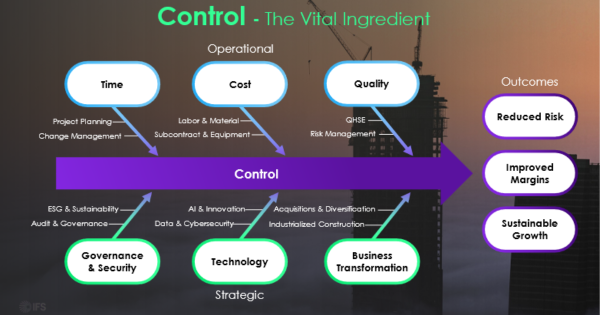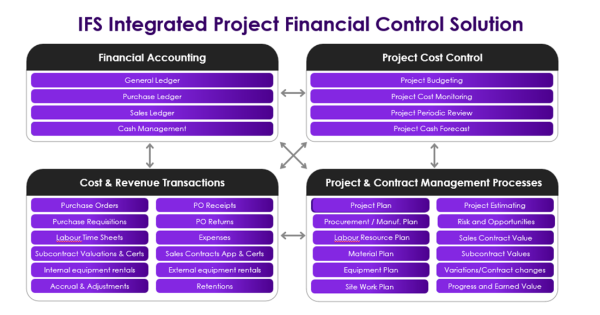The engineering and construction industry is facing many challenges.
In a recent independent global survey of the industry carried out by Censuswide Research, the top challenges and goals that were identified included:
- Improving project and business margins
- Having timely, real-time and accurate management information as a single source of truth
- Mitigating project and business risk
- Sustainable growth and diversification
- Increase business resilience
- Increase business performance predictability
- Overcoming supply chain issues including shortages of construction materials and price increases
- Maintaining regulatory compliance
Tackling these challenges is not easy when we are surrounded by global economic and political uncertainties.
If there is one word that describes what companies need to navigate these challenges and outperform their competitors, it is the word CONTROL.

The slide above demonstrates the ‘cause and effect’ of having greater control.
Firstly, at an operational level, this is about being in control of your projects by enabling standardized, repeatable best practice project processes.
It is about being in control of time, cost and quality.
Time
By integrating the project plan with the sub plans such as Engineering, Procurement, Manufacturing, Construction and Installation everyone is working to a common joined up plan. Change management also needs to interact with these plans to ensure the project is reflecting the latest scope to ensure the project is delivered on time. This type of controlled process where the plan is driving all the project departmental deliverables will increase control and improve on-time project delivery performance. Too often the project plan is a pretty Gantt picture and the individual functions are working to their own out of synch plans using lots of disparate Excel spreadsheets. This is not being in control.
Cost
Controlling project costs, revenues and margins is essential. That means having accurate real time information on the project actual costs including materials, labor, equipment, sub-contract packages and overheads. We also need to manage and optimize these resources so that productivity and efficiency are maximized. The project cost control process should be fully integrated with the accounting system ensuring there is only one version of the truth. This eliminates the need for Excel, a very common source of inaccuracy and delay in knowing what is happening.
Having integrated accounting and project cost tracking is only part of the story. To have true Project Financial Control we need to manage and have integrated project estimating, budgeting and periodic project forecasting processes and support commercial, planning, supply chain, contract and risk management processes as well. The diagram represents what a best in class project financial control landscape looks like where everything that impacts money and cash is integrated.

Quality
By embedding robust Quality, Health, Safety, and Environment (QHSE) practices and risk management processes, we ensure high standards and safe operations.
Strategic Control
Effective Control goes beyond operational control. It is also essential to have control over the more strategic aspects of the business, this is critical to long-term success.
Compliance
This includes enabling ESG and sustainability initiatives, ensuring adherence to audit and governance requirements, and driving ethical operations.
Technology
To remain competitive, organizations need to be able to seamlessly incorporate BIM (Building Information Modeling), AI and other innovations into their business. But this is also about data and cybersecurity – having a modern and secure construction ERP (Enterprise Resource Planning) platform is a pre-requisite for a future proof technology strategy.
Business Transformation
Finally, having a broad, flexible and scalable solution helps, rather than hinders, organizations as they grow through acquisition or diversification so that your organizations can capitalize on emerging industry trends – for example expanding their footprint into industrialized construction or service management. This is another example of how construction ERP and construction asset management software can deliver true business agility.
By gaining greater control, both operationally and strategically, your leaders such as the Chief Financial Officer, and your entire organization will realize critical business outcomes such as improving Margins, Reducing Risk and driving Sustainable Growth.
So, CONTROL is essential to ensure that you are not just solving immediate challenges and goals but also enabling your business to be more resilient and thrive in the future.
IFS provides the best ERP software for construction solutions that are designed to give Construction and Engineering companies total operational and strategic control.
Learn more about how IFS Cloud ERP delivers best-in-class project financial control.